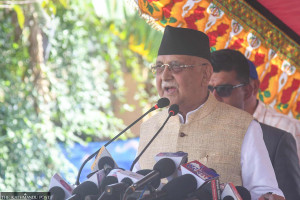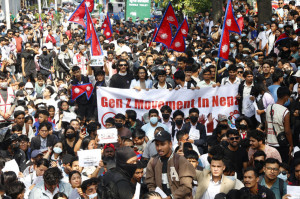Opinion
From the ground up
Good governance is the combined commitment of the government, communities, civil organisations, and the private sector
Binayak Basnet
Half a century ago, in the dawn of a new world order, Nepal’s fundamental objective on the global front seemed very clear and simple—enhance the dignity of the country by maintaining sovereignty, integrity, and independence. Half a century later, Nepal remains behind a world leaping far ahead, lacking a sovereign constitution, an unequal and divided population, conservative social changes, and a still-large dependency on foreign loans, aid, and imports.
Though a whole bag full of issues are argued to have caused this state of affairs, at the very core, it is actually decades of dwelling on an unsystematic approach to good governance. Social scientists and academicians consider the term ‘good governance’ as acutely contested and clustered. For example, the spectrum of good governance does not only cover the services rendered by the public and judicial administrations, but is also the combined commitment of communities, non-governmental social organisations, and the private sector. It is clustered in ensuring that this structure is systematic, accountable, participatory, competitive, transparent, service- and result-oriented, inclusive, and most importantly, efficient under the rule of law.
Existing problems
In Nepal, however, these contributing organisations have encountered many challenges and problems, resulting in national defilement and ill governance. Most books on general civic knowledge, distributed throughout the country as curriculum for the public service (loksewa) exam, clearly mention some of the challenges and problems related to ill governance, which are vast and diverse.
These problems range from the government’s lack of coherence among its policies and programs, the lack of detailed working procedures, monitoring, and evaluating systems, and the frequent transfer of chiefs of development programmes and projects under an ever-changing political power-sharing formula to the inadequate supply of basic necessities at the local level and the lack of a standard labour force equipped and powered by informed knowledge and intellectual deftness.
The challenges, on the other hand, revolve around the inability of organisations contributing to good governance to address the elements of good governance itself. In the 215th page of a national broadsheet distribution, Trinity Master of General Knowledge (2011), “To address the element of good governance with full commitment, in order to materialise the commitments of the Interim Constitution and the Interim Government,” is stated as one of the major challenges to good governance!
Devolving power
It seems that a top-down approach to solve the problems of governance in Nepal have not been effective. Strategies that have been implemented by the government so far have not delivered. Control of corruption, empowerment of security and judicial administrations to provide expedient services, and the development of a culture that preserves, promotes, and respects human rights, all of which are ideal approaches, also have not materialised.
The concept of devolved governance is useful here, as within its broad characterisation lies the practice of vertical and horizontal decentralisation. In devolved governance, the central power of the government is shared rather than consolidated, and with the sharing of power, responsibility is shared as well. In Nepal, the central government has shared its power and responsibility in many areas, including at the sub-national level, where the people are at the centre. This is also the essence of a functional democracy where citizens play a constructive role in all areas of society, including governance.
The practice of decentralised power and democracy in Nepal, however, is misunderstood to be limited to paying taxes and voting. This has created a vacuum in result-based coordination for national agendas. In this void, political parties and politicians are able to engage in a blame game that maintains their occupation of the government by constant exchange among themselves. This leads to a condition where government is seen as incapable, which only deepens the state of bad governance.
So it is important to deliver a functional and responsible society from the ground up. The growth of self-interest in society has to coincide with self-responsibility. Coordination amongst individuals, regardless of their backgrounds and social status, has to be a priority. Better conditions at education and work have to be guarded through self-engagement to develop an awakened people working together to maintain and enhance national dignity. A favourable form of engaged governance can be achieved and ensured thus, Finally, in a short backtrack into optimism, as a young fractured nation revived from the rubbles of a decade-long civil war, there are extraordinary opportunities to not only get things going the right way but also prove as an example of nation building.
Basnyat holds a Masters in Diplomacy and International Studies




 24.12°C Kathmandu
24.12°C Kathmandu










